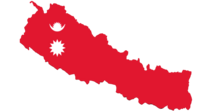Bhupi Sherchan
Bhupi Sherchan | |
|---|---|
भूपी शेरचन | |
Ghumne Mech Mathi Andho Manche | |
| Spouses |
|
| Children | 8 |
| Parents |
|
| Awards | Sajha Puraskar |
| Website | bhupisherchan |
Bhupendra Man Sherchan, popularly known as Bhupi Sherchan (1937–1989) was a
Early life and education
Sherchan was born on 27 December 1937 (12 Poush 1992
His mother died when he was five years old. At the age of around ten or twelve, he moved to Banaras with his elder brother, Yogendra Man and niece, Urmila.[4]
Student life
While in college, he started being involved in politics. The main political parties in Banaras then were the Congress and Communists. Sherchan became associated with the Communists. He published his first work, a play titled Pariwartan, in 1951, while in college. The play was published under his real name Bhupendra Man Sherchan, when he 16 years old. It was inspired by the anti-Rana protest in Nepal. He also started writing Sarbahara (Proletariat) after his name.[citation needed]
Since his brother was a member of the Nepali Congress and he was Communist, there was an ideological rift between the brothers which led to Sherchan moving out of his brother's residence. He started writing poems under a pseudonym. Simultaneously, protests against the Rana regime had begun in Nepal. He took part in the protests which led to his imprisonment.[4] He received a BA degree from Banaras College.[5]
Literary life
Sherchan's family traditionally worked as traders and merchants, but he did not pursue either profession. Instead, he decided to immerse himself in the Nepali literary world. His first poetry collection Nayam Jhyaure was published by Janayug Prakashan, Benaras, in 1953. The poetry collection was published under his pseudonym Sarbahara (Proletariat) and was influenced by communist ideology. In 2012
Nirjhar, Sherchan's second poetry collection was published in 1958 by Narendra Yantralaya in Kathmandu. The poems in this collection follow the Nepalese metric style (Chhanda). He started writing under the name Bhupi Sherchan after publishing Nirjhar. In 1969,
Bhupi Sherchan Ka Kavita, a poetry collection edited by Shiva Regmi was published in 2008. The collection contains poems published in various literary magazines but not included in Ghumne Mech Mathi Andho Manchhe.
He is considered the most successful Nepalese poet to have employed free verse. His poems reflected his analysis of humans and human life from different perspectives, and his biggest contribution to Nepalese society is regarded to be his attempts to guide his generation through poetry. His Himalayan nationalism can be seen in his poem Hami (Us), where he claimed that Nepalese are brave, but foolish (because they are brave).
Sherchan produced several odes to the martyrs of Nepal, including Sahid Ko Samjhana, Main Batti Ko Sikha, and Ghantaghar. Ghumne Mech Mathi Andho Manche (Blind Man on a Revolving Chair) is his most popular poetry collection.[7]
He was also appointed a member of the Royal Nepal Academy for two terms from 1979 to 1989.
Notable works
Play
- Pariwartan (transl. Change, 1951)
Poetry collections
- Nayam Jhyaure (transl. New Songs, 1956)
- Nirjhar (transl. Waterfall, 1958)
- Ghumne Mech Mathi Andho Manche (transl. A Blind Mind on A Revolving Chair, 1969)
- Bhupi Sherchan Ka Kavita (transl. Poems of Bhupi Sherchan, edited by Shiva Regmi, 2008)
Personal life and death

Sherchan married twice. His first marriage was to Om Kumari Tulachan and in 1969, he married Kanti Rana. He had six children (five daughters and a son) with Om Kumari Tulachan and two (a daughter and a son) with Kanti Rana. Since his college days, he had developed the habit of smoking that led to lung-related complications later.[8] He was also interested in music and cricket.[9]
He died on 14 May 1989 (1 Jestha 2046 BS) in Kathmandu.[10][11]
Legacy
Sherchan is considered the pioneer of free verse poetry in Nepali literature.[12] Prof. Michael J. Hutt published Sherchan's biography, The life of Bhupi Sherchan: Poetry and Politics in Post-Rana Nepal in 2010. The biography also contains Sherchan's poems translated by Hutt into English.
In 2023, his daughter, Kavita, published another biography entitled Bhupi: A Daughter's Memoir.[13]
The title of the 2022 Nepali movie Chiso Ashtray is based on Sherchan's poem from the collection Ghumne Mechmathi Andho Manche, of the same name.[14]
See also
References
- ^ "विचलनका माझ भूपी". विचलनका माझ भूपी. Retrieved 5 April 2022.
- ^ "The lost decades". kathmandupost.com. Retrieved 5 April 2022.
- ^ "Bhupi Sherchan (1936-1989)". Himalayan Voices. 1991. Retrieved 11 July 2014.
- ^ a b "भूपी- नेपाली साहित्यका मुर्धन्य साधक". साहित्यपोस्ट. 15 May 2021. Retrieved 5 April 2022.
- ^ "कवि भूपि शेरचनको जीवनी". muktikhabar (in Nepali). 13 November 2018. Retrieved 5 April 2022.
- ^ रातोपाटी. "भूपिलाई राज्यले उचित सम्मान गर्नै सकेन : प्राडा. कृष्णहरि बराल". RatoPati (in Nepali). Retrieved 5 April 2022.
- ISBN 9780520910263
- ^ "भूपि शेरचनको अन्तिम अन्तर्वार्ता". भूपि शेरचनको अन्तिम अन्तर्वार्ता. Retrieved 5 April 2022.
- ^ संवाददाता, केन्द्रबिन्दु. "आज भूपी शेरचनकाे ८४ औं जन्म जयन्ती". kendrabindu.com (in Nepali). Retrieved 5 April 2022.
- ^ "भूपी शेरचन - कविता कोश". kavitakosh.org (in Hindi). Retrieved 19 January 2022.
- ^ "Beloved Poet Bhupi Sherchan". The Gorkha Times. 7 November 2020. Retrieved 5 April 2022.
- ^ "भूपी शेरचन : नेपाली आधुनिक गद्यकविताका राजमार्ग". Chitwan Post Daily. 6 August 2016. Retrieved 5 April 2022.
- ^ "A daughter's tribute". Khatmandhu Post. Retrieved 28 August 2023.
- ^ Republica. "Trailer of 'Chiso Ashtray' based on Bhupi Sherchan's poem released". My City. Retrieved 5 April 2022.
Further reading
- M.J. Hutt, The life of Bhupi Sherchan: Poetry and Politics in Post-Rana Nepal Oxford University Press, New Delhi, 2010, ISBN 978-0-19-806827-3


